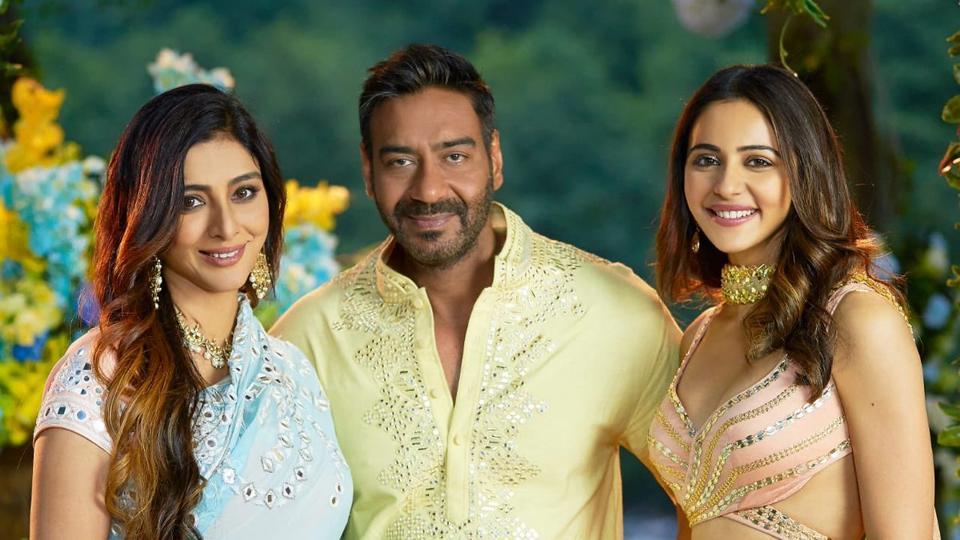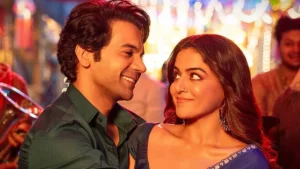
Family comedy is a tricky space in Hindi cinema today. Particularly looking at the volume they are churned out at, it is hard to give them the leeway to dismantle the template. Several of these stories contain unobvious layers of progressiveness as they make for a decent selling proposition. Ditto for their tendency to mock small town living with a generous dose of exaggeration. One that converges several of these trends, it was unlikely for the lazily titled De De Pyaar De to spring a surprise. Proving for once that a lacklustre trailer is no indicator of a film’s actual merits, this Akiv Ali-helmed project delivers and how. In fact, it nearly knocks it all the way across the boundary as far as present-day formula Hindi films are concerned.
Written jointly by Luv Ranjan, Tarun Jain and Surabhi Bhatnagar, De De Pyaar De talks about a 50-year-old single man Ashish (Ajay Devgn) who falls in love with the 26-year-old Aisha (Rakul Preet Singh). Things unfold like one of those rare watchable Bollywood capers until the man declares that he needs to make his ladylove meet his ex-wife Manju (Tabu) and children (who are in their twenties). The premise is fresh and also tad unusual for a big ticket film featuring seasoned stars. Director Akiv Ali packs the film with loads of humour and the lingo is quite contemporary for most parts. The lead characters (Ashish and Manju in particular) share some compelling moments and the film doesn’t allow us to judge them for their choices. Additionally, it is refreshing to see independent women with emotional agency in a film penned by Luv Ranjan who is known for projecting reckless misogyny in his erstwhile works.
To highlight the fresh bits further, De De Pyaar De does decent justice to several of the issues that it tackles – some of which could have easily been labelled risqué a decade back. The film offers a mature take on divorce and it only adds that an actor of Tabu’s calibre gets to mouth certain fiddly lines. Those are certainly sermons if one may put it that way but thanks to some clever dialogues and the actor’s ability to make complexities appear as mere cakewalks, the message stands well-served. The film also addresses the pangs of single parenthood without throwing a shade on righteousness and certain regressive ideas often dubbed in the garb of traditional Indian modesty. The issues appear real even though some of the resolutions are tad simplistic. De De Pyaar De’s attempt to approve of the age difference between lovers too go through its share of scrutiny. For instance, it asks several uncomfortable questions that perhaps the society and the lovers themselves might have asked otherwise. Their worries regarding children, ageing and the need to fulfil each other’s sexual needs are legitimate and are in fact addressed with grace despite the film’s comedic tone. Yes, there are certain conversations (and situations) that are annoying but one must give to De De Pyaar De for constructing a framework that is acceptable for a larger spectrum of the audience while also asserting its core themes dexterously.
On the flip side, it takes us a while to get used to Aisha’s ways. Unevenly sketched in places, her free-spiritedness closely borders on areas where she appears to be a person sans morals. We know that Aisha is no opportunist whilst De De Pyaar De’s writers are clueless on how to put it across. Moreover, we never get to see Aisha’s actual career pursuits and reasons to behave the way she does – which also includes randomly falling in love with an older man. Of course, the film throws in a cameo by Sunny Singh (flashing those charming pearlies yet again), who does the “irritating” boyfriend part to the T. However, that doesn’t exactly do much to explain Aisha’s magnetic pull towards Ashish. The character pretty much settles post interval but several of these uneven elements persist, only to re-emerge in a sporadic fashion. Talking about the mid-point, De De Pyaar De also feels drastically different in either halves. The tonal shift is so sudden and rough that it feels almost like two different films with the latter one (filled with better actors and genuine humour) faring better in comparison.
De De Pyaar De, in portions, is way too formulaic. Debutante Ali’s film-making style is quite tell-tale as there is almost nothing in the plot that he drops off as subtexts. Establishing its Bollywood-ness further, the film offers full-fledged (and yawn-inducing) songs when its characters are upset. They pave the streets in slow motion. The leading lady (a waitress) spills a drink on a patron because – guess what – she just broke up. People travel in and out of first world countries with no questions asked about visa and other formalities. Easily, matters of the heart are best expressed if spoken face-to-face. Some of the film’s issues are way too convenient (the daughter’s marriage being one) and the solutions also are of quick fix variety. To mar the impact further, the final segment involving the trio bears problematic shades for the fact that it offers a bizarre justification for adultery.
That said, De De Pyaar De in all honesty is a decent addition to Bollywood’s commercial cinema vertical which is slowly going out of relevance. The pacing is just right and the central performances (Devgn, Tabu, Singh) are balanced. The film also elicits extra humour through some harmless sidetracks, be it Jimmy Sheirgill as flirtatious VK or with Bhavin Bhanushali playing Devgn’s son Ishaan who is infatuated with Aisha. And finally, when was the last time we saw a leading lady in a Hindi film play a stripper with no taboo attached? Not that bad, I say.
Rating: ★★★

